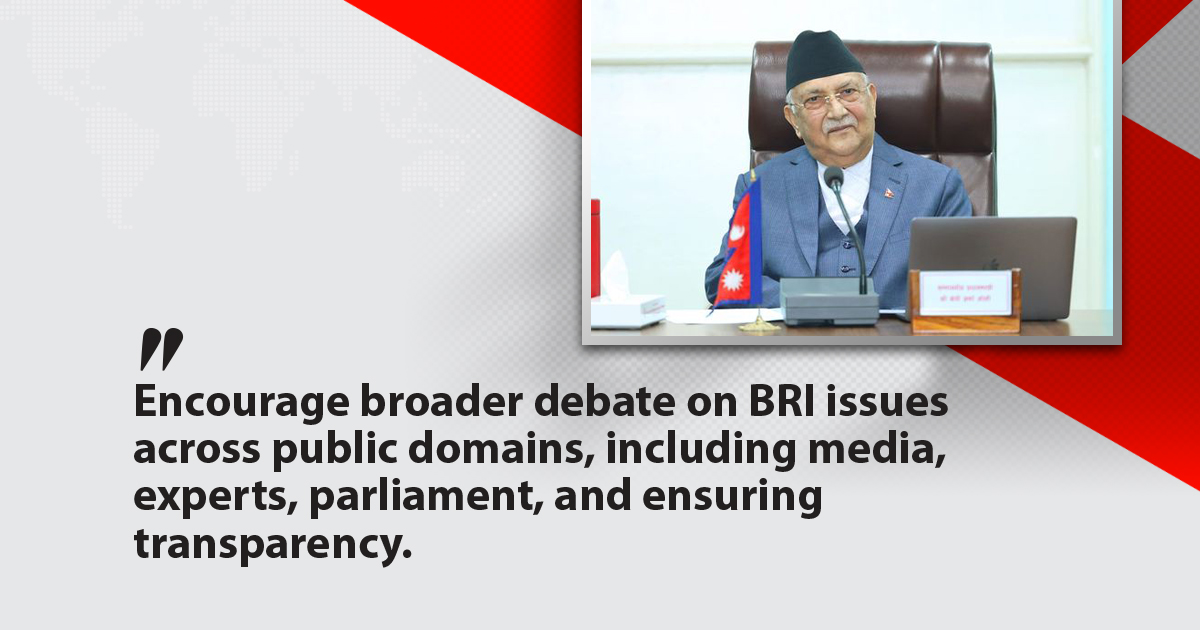

KATHMANDU: Prime Minister K.P. Sharma Oli is set to officially visit China from December 2 to 6 at the invitation of Chinese Premier Li Qiang.
However, the government has yet to announce the date or agenda for this visit. Tensions between the ruling Nepali Congress (NC) and the CPN-UML have intensified, with disagreements over the Belt and Road Initiative (BRI) deepening the divide between the two parties.
The Nepali Congress has expressed a preference for grants over loans for BRI projects, while the UML supports both grants and loans.
To navigate these differences, the ruling parties have established a high-level political mechanism ahead of Oli’s visit, with Foreign Minister Arzu Rana coordinating the preparations.
Notably, the Nepali Congress made a formal decision in July 2024 against taking loans for BRI projects, preferring to pursue previous agreements with China rather than new ones.
Additionally, agreements made during Chinese President Xi Jinping’s visit to Nepal in October 2019 remain unimplemented.
Historically, PM Oli has been seen as a close ally of China, and he aims to strengthen ties with Beijing. However, many NC leaders are skeptical about China’s influence in Nepal, fearing it could compromise national interests.
Chinese diplomats have privately expressed their support for Oli, viewing him as a pro-China leader.
Confidential meetings between PM Oli and Chinese diplomats, alongside efforts by his economic advisor Yubaraj Khatiwada and UML secretary general Shankar, aim to advance BRI implementation.
Oli’s attempts to deepen ties with China have raised concerns within the Nepali Congress, which worries about the potential for a debt trap through BRI projects.
The Congress’s stance on the BRI—favoring grants and opposing loans—poses a challenge for Oli, who must balance relations with Beijing while maintaining coalition harmony at home.
Former Prime Minister Pushpa Kamal Dahal ‘Prachanda’ has accused Oli of attempting to use a “China Card,” describing his proposed visit as indicative of political immaturity.
To navigate this complex landscape, the government should encourage broader public debate on BRI issues, involving media, experts, and parliament.
Transparency about BRI-related documents, similar to the approach taken with the American MCC grant project, is crucial.
Moreover, evaluating the experiences of South Asian countries with the BRI will provide valuable insights.
Nepal requires a transparent and predictable approach to BRI implementation, emphasizing the need for sustainable financing.
The structural challenges of the BRI extend beyond mere presentation; Nepal must maintain its current status quo without alienating major donors and supporters.
The absence of G7 participation in the Belt and Road Forum for International Cooperation and India’s sensitivity to the BRI underscore the need for careful navigation.
Failure to grasp these dynamics could lead to significant economic repercussions. Concerns about China’s “debt-trap diplomacy” have been raised in Western media, highlighting cautionary tales from countries like Sri Lanka, Pakistan, Laos, and Tajikistan.
Nepal must review its BRI stance, assess the implementation experiences of other nations, and align its foreign policy with the evolving global landscape. Initiating an inclusive, multi-party debate and fostering public discourse on the BRI is essential for building national consensus before proceeding.
Public discussions and parliamentary debates, alongside transparency similar to that seen with the MCC, are necessary to ensure informed decision-making.
The government must prioritize national interests and foreign policy objectives by maintaining a balanced approach, ensuring sensitive issues are deliberated extensively among political parties and stakeholders.
Nepal should safeguard its strategic and economic interests while considering the legitimate concerns of friendly nations, avoiding geopolitical entanglements that could position it as a flashpoint between rival powers.
China can support Nepal’s development through increased investments, grants, and improved trade conditions, all without necessarily tying these initiatives to BRI implementation.
It is vital to review and implement previous agreements with China before entering new commitments, ensuring alignment among all political parties on national priorities.
Ultimately, Nepal must craft its diplomacy with care, avoiding dependence on any single power while fostering informed debates on the BRI.
Diverse viewpoints within Nepal must be carefully considered, as unilateral actions—such as those by Prime Minister Oli—risk complicating stakeholder relations and impacting foreign relations for years to come.
Nepal’s approach to the BRI should not only serve strategic interests but also prioritize sustainable development and national consensus.